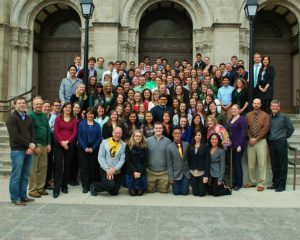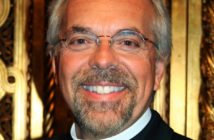
ESTEEM | St John Church and Student Center
Source: Chicago Catholic
by Kerry Alys Robinson
Close to half a million Catholics in the United States have just graduated from college, and almost as soon as they did their participation in the church plummeted.
For decades, leaders of the U.S. church have observed that many young-adult Catholics enjoy a positive experience of the church while they are in college, either because they attend a Catholic university or because they attend a secular university with a vibrant Catholic campus ministry. Catholic students note the exceptional liturgies, relevant homilies, student participation, opportunities for service and attention to helping them develop a mature faith that is both cognitive and affective. So why does the church lose these active participants when they graduate?
The prognosis has always been the same: College graduates drift away from the church for a period of time. They move to new cities, start new jobs and encounter neighborhood parishes with few single young adults. We know that the church risks losing them for a time, but they will come back when they get married, have a child or experience a personal crisis.
I have heard this all my life. Geoff Boisi, founding chair of Leadership Roundtable, and Father Bob Beloin, Catholic chaplain at Yale University, were the first to point out, “That is not a good strategic plan.” And they set about finding a solution.
Their first observation was that the prediction was no longer true, if it ever had been. Young-adult Catholics are not coming back to the church. For one thing, they are not necessarily marrying other Catholics or raising their children Catholic. The long-term impact is that the church is losing its best-educated generation.
From a leadership perspective, this is a human-resource challenge of enormous consequence. From a campus-ministry perspective, this is a disheartening reality. How can we prepare college students for active engagement in the church and ensure that the church would be welcoming to young adults once they graduated?
One answer came through harnessing the vibrancy of the Catholic center at Yale and the problem-solving capabilities of Leadership Roundtable to create a curriculum and framework for preparing college students for leadership in the church after graduation. Leaders from across the country with expertise in young adult ministry, campus ministry, human-resource development, leadership development, theology, canon law, ecclesiology and sociology were convened.
A young-adult leadership formation program was created called ESTEEM, Engaging Students to Enliven the Ecclesial Ministry. Piloted on 12 campuses from Stanford to Yale, and now in its seventh year, campus ministers invite “the best and brightest” young-adult Catholics to participate in the yearlong program. Through retreats, seminars and guest lectures, students are immersed in ecclesiology, canon law, Catholic social teaching, intellectual, sacramental and liturgical life and leadership formation. The program culminates in a national capstone conference, which this year took place in Chicago.
Each student is paired with a mentor, a local leader whose field of expertise most closely aligns with the professional aspirations of the student. Mentors are on hand throughout the year for informal discussion on the role of faith in professional life, in vocational discernment and in leadership. The most significant aim of ESTEEM, however, is to equip the student participants for meaningful leadership after graduation: by being appointed to a parish pastoral council, a diocesan finance council or the board of trustees of a Catholic nonprofit.
ESTEEM’s vision is to have two young adults in leadership in every parish, diocesan office and Catholic charity, from Loyola University Chicago to the local soup kitchen. If young adults see other young adults in meaningful positions of leadership they know that their voice and perspective matter. Young adults serving on boards will learn from older, more experienced trustees, offer their own perspective on ways to strengthen mission and attract a new generation.
Young adults are ready to serve as leaders in the church. How ready are we to welcome them to such leadership?
Robinson is the founding executive director and global ambassador of Leadership Roundtable.



